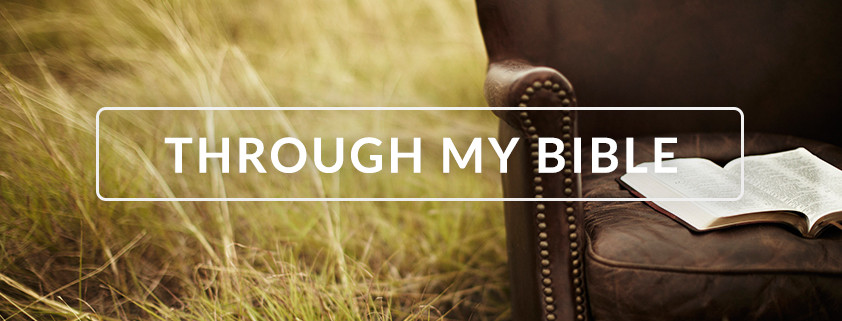Through My Bible Yr 03 – November 29
Through My Bible Yr 03 – November 29
1 Corinthians 1:18 – 2:16
Through My Bible – November 29
1 Corinthians 1:18 – 2:16 (EHV)
See series: Through My Bible
1 Corinthians 1
God’s Way of Saving People Seems Foolish to Some
18 For the message of the cross is foolishness to those who are perishing, but to us who are being saved, it is the power of God. 19 In fact, it is written:
I will destroy the wisdom of the wise;
the intelligence of the intelligent I will bring to nothing. [1]
20 Where is the wise man? Where is the expert in the Jewish law? Where is the probing thinker of the present age? Has God not shown that the wisdom of this world [2] is foolish? 21 Indeed, since the world through its wisdom did not know God, God in his wisdom decided to save those who believe, through the foolishness of the preached message. 22 Yes, Jews ask for signs, Greeks desire wisdom, 23 but we preach Christ crucified—which is offensive to Jews and foolishness to Greeks, 24 but to those who are called, both Jews and Greeks, Christ is the power of God and the wisdom of God. 25 We preach Christ crucified, because the foolishness of God is wiser than men, and the weakness of God is stronger than men.
26 For example, consider your call, brothers. Not many of you were wise from a human point of view, not many were powerful, and not many were born with high status. 27 But God chose the foolish things of the world to put to shame those who are wise. God chose the weak things of the world to put to shame the things that are strong, 28 and God chose the lowly things of the world and the despised things, and [3] the things that are not, to do away with the things that are, 29 so that no one may boast before God. 30 But because of him you are in Christ Jesus, who became for us the wisdom from God, namely, our righteousness and sanctification and redemption. 31 God did this so that, just as it is written, “Let the one who boasts boast in the Lord.” [4]
1 Corinthians 2
1 As for me, brothers, when I came to you, I did not come with superior speech or wisdom in order to proclaim to you the testimony [5] of God. 2 For I had no intention of knowing anything among you except Jesus Christ, and him crucified. 3 I came to you [6] in weakness, in fear, and with much trembling. 4 My message and my preaching were not marked by persuasive words of human [7] wisdom, but by a demonstration of the Spirit and of power, 5 so that your faith would not rest on human wisdom, but on God’s power.
In-Depth Wisdom Is for Spiritual People
6 Yet we do speak wisdom among those who are mature, but it is not a wisdom of this world or of the rulers of this world, who are being reduced to nothing. 7 Instead we speak God’s wisdom that has been hidden in mystery—before the ages, God foreordained that this wisdom would result in our glory. 8 None of the rulers of this world knew it. (If they had known it, they would not have crucified the Lord of glory.) 9 But as it is written:
What no eye has seen and no ear has heard
and no human mind has conceived—
that is what God has prepared for those who love him. [8]
10 But God revealed it to us through his [9] Spirit. For the Spirit searches all things, even the depths of God. 11 Indeed, who among men knows a man’s thoughts except the man’s spirit within him? So also, no one else knows God’s thoughts except God’s Spirit.
12 What we received is not the spirit of the world, but the Spirit who is from God, so that we might know the blessings freely given to us by God. 13 We also speak about these things, not in words taught by human wisdom, but in words taught by the Spirit, combining spiritual truths with spiritual words. [10] 14 However, an unspiritual person does not accept the truths taught by God’s Spirit, because they are foolishness to him, and he cannot understand them, because they are spiritually evaluated. 15 But the spiritual person evaluates all things, and he himself is evaluated by no one. 16 Indeed, “Who has known the mind of the Lord? Who will instruct him?” [11] But we have the mind of Christ.
Footnotes
- 1 Corinthians 1:19 Isaiah 29:14
- 1 Corinthians 1:20 Some witnesses to the text read the world. (“Witnesses to the text” mentioned in footnotes may include Greek manuscripts, lectionaries, translations, and quotations in the church fathers.)
- 1 Corinthians 1:28 Some witnesses to the text omit and.
- 1 Corinthians 1:31 Jeremiah 9:24
- 1 Corinthians 2:1 A few witnesses to the text read mystery.
- 1 Corinthians 2:3 Or I was with you
- 1 Corinthians 2:4 A few witnesses to the text omit human.
- 1 Corinthians 2:9 Isaiah 64:4
- 1 Corinthians 2:10 Some witnesses to the text read the.
- 1 Corinthians 2:13 Or explaining spiritual truths to spiritual people
- 1 Corinthians 2:16 Isaiah 40:13
The Holy Bible, Evangelical Heritage Version®, EHV®, © 2019 Wartburg Project, Inc. All rights reserved.

